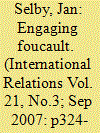| Srl | Item |
| 1 |
ID:
078891


|
|
|
|
|
| Publication |
2007.
|
| Summary/Abstract |
This article provides a critical survey of the appropriation of the work of Michel Foucault within poststructuralist IR. Foucault has thus far been employed within poststructuralist IR in three ways: to support deconstructions of realist international theory; to analyse modern discourses and practices of international politics; and to develop novel accounts of the contemporary global liberal order. I argue that the first and the third of these usages are especially problematic. Utilised for the critique of realism, Foucault's main emphases have consistently been overlooked or misrepresented. By contrast, when `scaled up' to inform analyses of world order, Foucault's work has ended up supporting essentially liberal accounts of international politics. There are, I argue, clear limits to the use of Foucault in theorising international and world politics, and given this I conclude that if Foucault is to be used more effectively within IR, his work needs to be situated within a framework - I suggest a Marxist one - which is cognisant both of the structural dimensions of power, and of the specificity and irreducibility of the international
|
|
|
|
|
|
|
|
|
|
|
|
|
|
|
|
| 2 |
ID:
151239


|
|
|
|
|
| Summary/Abstract |
As the continued health of the plantation sector in Sri Lanka remains a vital part of the Sri Lankan economy, so too must the continued well-being of the people working and living in the estates remain an important concern. The tea industry must confront several challenges in the near future, some which have remained unaddressed for several decades and others that are only now becoming apparent. This paper analyses the current challenges and opportunities facing the people involved in the plantation economy in Sri Lanka – most specifically, the Up-country Tamils, who comprise most of the labour force. Arguably, the plantation system is an unethical economic scheme engendering a parallel political structure to reinforce the plantation economy. Despite some changes to the system during the nearly 200-year existence of plantation economics in Sri Lanka, transformative structural reform remains elusive, with the plantation sector dependent on a resident labour force that exercises limited power over both the economy in which they participate and the spaces they inhabit. This article thus focuses on the efforts of Up-country Tamils to challenge patterns of power and control in the plantation region and forge a new society within an increasingly authoritarian post-war state.
|
|
|
|
|
|
|
|
|
|
|
|
|
|
|
|
| 3 |
ID:
165702


|
|
|
|
|
| Summary/Abstract |
For super-diversity to describe the diversification of Asian global cities, it should be discussed with reference to existing regimes governing diversity. In Singapore, the postcolonial state instituted the multiracialism of equality between the ‘races’ of colonial governmentality, so as to manage the ethnic diversity of ‘the plural society’. However, contemporary immigrations disrupted this multiracialism. The political response focused on managing the mobilities of low-wage migrant workers. Drawing on my research on urban change, I show that the this led to the bio-political management of migrant worker mobilities and articulation of the discourse of needs. I argue that the 2013 riot by migrant workers accelerated the production of dormitory space to exclude migrant workers from access to the city and reproduce their physical needs. The case of Singapore shows that we need to ‘moor’ the understanding of super-diversity in Asian global cities to the postcolonial management of diversity and migration.
|
|
|
|
|
|
|
|
|
|
|
|
|
|
|
|